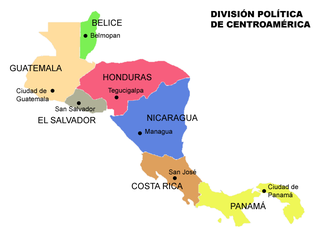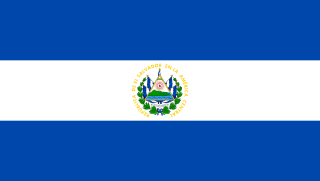Related Research Articles

This is a demography of the population of El Salvador including population density, ethnicity, education level, health of the populace, economic status, religious affiliations and other aspects of the population.

San Salvador is the capital and the largest city of El Salvador and its eponymous department. It is the country's political, cultural, educational and financial center. The Metropolitan Area of San Salvador, which comprises the capital itself and 13 of its municipalities, has a population of 2,404,097. The urban area of San Salvador has a population of 1,600,000 inhabitants.

The Nahua people, also academically referred to as Pipil, are an indigenous group of Mesoamerican people inhabiting the western and central areas of present-day El Salvador. Although very few speakers are now left, they speak the Nawat language, which belongs to the Nahuan language branch. Indigenous accounts recorded by Spanish chronicler Gonzalo Francisco de Oviedo suggest that the Nahuas of El Salvador migrated from present-day Mexico to their current locations beginning around the 8th century A.D. As they settled in the area, they founded the city-state of Kuskatan, which was already home to various groups including the Lenca, Xinca, Ch'orti', and Poqomam.

Alfredo Félix Cristiani Burkard is a Salvadoran politician who was President of El Salvador from 1989 to 1994.

Antiguo Cuscatlán(colloquially known as Antiguo) is a municipality in the La Libertad department of El Salvador, and its eastern tip lays in San Salvador Department part of the Metropolitan Area of San Salvador, southwest of San Salvador and southeast of Santa Tecla. The population was 48,027 at the 2010 census. Antiguo Cuscatlán can be translated as Old Jeweled City: Antiguo means ancient or old in Spanish, and Cuscatlán means jeweled city in Nahuat. The city used to be the capital of the Pipil or Cuzcatecs, before the Spanish conquest of the New World.

Club Deportivo Atlético Marte, also known as Atlético Marte, is a Salvadorian association football club based in San Salvador.

Central America is a subregion of the Americas formed by six Latin American countries and one (officially) Anglo-American country, Belize. As an isthmus it connects South America with the remainder of mainland North America, and comprises the following countries : Belize, Guatemala, Honduras, El Salvador, Nicaragua, Costa Rica, and Panama.
Jews have been present in El Salvador since the early 19th century, starting with Sephardic Jews and continuing with the arrival of refugees from Europe during World War II. El Salvador has the second largest community in Central America, the majority established in San Salvador, which is the second city with the most Jews in Central America, behind Panama City.

José Matías Delgado y de León was a Salvadoran priest and doctor known as El Padre de la Patria Salvadoreña.
The German School of San Salvador is a K-12 private institution in Antiguo Cuscatlán, El Salvador, in the San Salvador metropolitan area. The school stands out in their PAES scores, being among the top ranked schools in the country.

Salvadorans, also known as Salvadorians, are citizens of El Salvador, a country in Central America. Most Salvadorans live in El Salvador, although there is also a significant Salvadoran diaspora, particularly in the United States, with smaller communities in other countries around the world.

The University of El Salvador or Universidad de El Salvador (UES) is the oldest and the most prominent university institution in El Salvador. It serves as the national university of the country. The main campus, Ciudad Universitaria, is located in the capital of San Salvador, but there are also branches of the university in other Salvadoran cities such as Santa Ana, San Miguel and San Vicente. The university counts a total of 9 faculties in its main campus and has a student population of more than 50,000.

José Arturo Castellanos Contreras was a Salvadoran army colonel and diplomat who, while working as El Salvador's Consul General for Geneva during World War II, and in conjunction with a Jewish-Romanian businessman named György Mandl, helped save up to 40,000 Central European Jews, most of them from Hungary, from Nazi persecution by providing them with fake Salvadoran citizenship certificates.

The Salvadoran military dictatorship was the period of time in Salvadoran history where the Salvadoran Armed Forces governed the country for almost 48 years from 2 December 1931 until 15 October 1979. The authoritarian military dictatorship limited political rights throughout the country and maintained its governance through rigged and fixed elections.

The Jewish Archive was the name given to a collection of documents compiled by the regime of Francisco Franco in Spain during the Second World War. In accordance with instructions of the Directorate of General Security the provincial governors of Spain assembled records of all Jews who lived in Spain, whether or not they were Spanish. Jorge Martínez Reverte has suggested that the resulting list, which recorded 6,000 Jews living in Spain, was handed to Heinrich Himmler's SS in 1941 and was included in Adolf Eichmann's Jewish Population Census, tabled at the Wannsee Conference, chaired by Reinhard Heydrich, in January 1942.

Nayib Armando Bukele Ortez is a Salvadoran politician and businessman who is the 43rd president of El Salvador, serving since 1 June 2019. He is the first president since José Napoleón Duarte (1984–1989) not to have been elected as the candidate of one of the country's two major political parties: the left-wing Farabundo Martí National Liberation Front (FMLN) and the right-wing Nationalist Republican Alliance (ARENA).
Rosa Amelia Guzmán was a Salvadoran journalist, feminist and suffragette. Her 1950 speech to the Constituent Assembly was instrumental in women gaining, not just the right to vote, but the rights of citizenship on 14 September. She was one of the first four women elected to serve in the Legislative Assembly of El Salvador.
Andre R. Guttfreund is a Salvadoran film director, producer and filmmaker. He is better known for the production of the 1976 short film In the Region of Ice, for which he received an Oscar at the 1977 Academy Awards with Peter Werner for Best Live Action Short Film, becoming the first and so far only Central American to receive an Oscar.

The Captain General Gerardo Barrios Military School, abbreviated as the EMCGGB, was a military academy in El Salvador. It was established in 1868 and is named after Captain General Gerardo Barrios who served as President of El Salvador from 1859 to 1863. It was located in Antiguo Cuscatlán, Santa Tecla, La Libertad. It was demolished in June 2022 to make way for the construction of the Estadio Nacional de El Salvador.
The Airport of the Pacific is a planned joint-use civilian international airport and military base which will be located in Conchagua, El Salvador, and will serve the city of La Unión. The airport was proposed by Salvadoran President Nayib Bukele during his 2019 presidential campaign as a part of his "Plan Cuscatlán" and construction was approved by the Legislative Assembly on 26 April 2022. Terraforming began in March 2023.
References
- ↑ Gómez, Moisés (2017). "Ser extranjero en Centroamérica. Génesis y evolución de las leyes de extranjería y migración en el Salvador: Siglos XIX y XX". Realidad: Revista de Ciencias Sociales y Humanidades (135): 117–151. doi: 10.5377/realidad.v0i135.3167 .
- ↑ "Deutsche in El Salvador".
- ↑ (In Spanish) La Prensa Gráfica La cofradía de Don Balta El Salvador, 22 September 2013. Retrieved, 26-11-2014
- ↑ "La historia del diplomático católico que salvó 40 mil judíos del holocausto".
- ↑ "Castellanos, el Schindler salvadoreño, salta a la gran pantalla".
- ↑ "El Salvador Virtual Jewish History Tour".
- ↑ "La historia del diplomático católico que salvó 40 mil judíos del holocausto".
- ↑ (In German) Auswärtiges Amt-El Salvador Information from Germany about El Salvador
